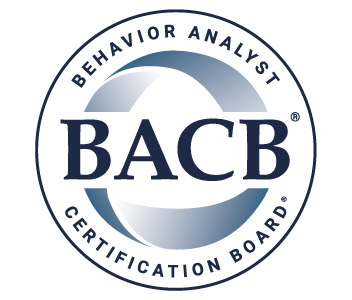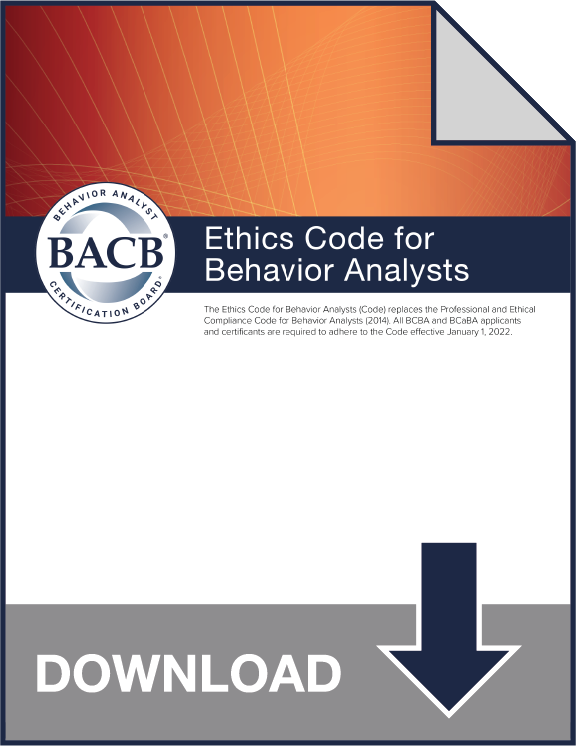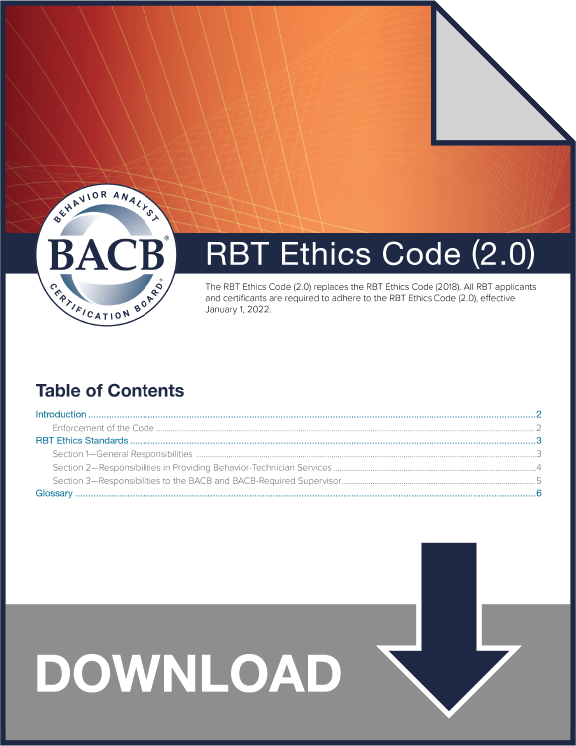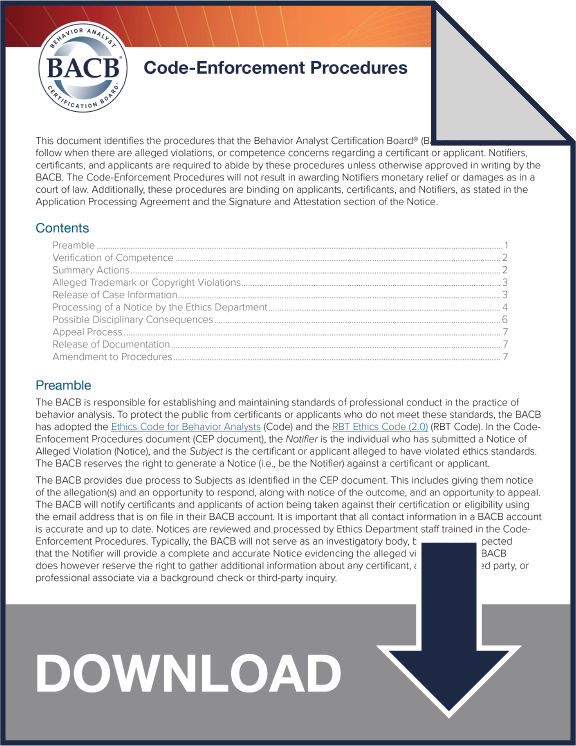BACB Ethics Requirements
The BACB’s ethics requirements, as outlined in the BACB’s various codes of ethics, provide the foundation for consumer, applicant, and certificant protection. Please check back periodically to ensure that you have the current versions of these documents.
Ethics Code for Behavior Analysts
The Ethics Code for Behavior Analysts outlines the ethics standards to which BCaBA and BCBA certificants and applicants and Authorized Continuing Education providers must adhere. It went into effect January 1, 2022. You can review the Crosswalk for Behavior Analyst Ethics Codes for more information about the differences between the past and current Codes.
| Date Edited Version Published: | Description of Update/Edit: | Original Text (if applicable): | Updated Text: | Location: |
|---|---|---|---|---|
| 09/06/2021 | Added definition of “assent” to glossary | N/A | Assent Vocal or nonvocal verbal behavior that can be taken to indicate willingness to participate in research or behavioral services by individuals who cannot provide informed consent (e.g. because of age or intellectual impairments). Assent may be required by a research review committee or a service organization. In such instances, those entities will provide parameters for assessing assent. |
Glossary, p.7 |
RBT Ethics Code (2.0)
The RBT Ethics Code (2.0) outlines the ethics standards to which RBT certificants and applicants must adhere. It went into effect January 1, 2022. You can review the Crosswalk for RBT Ethics Codes for more information about the differences between the past and current Codes.
Code-Enforcement Procedures
In keeping with its mission to provide consumer protection, the BACB works to promote and maintain standards of professional conduct in the practice of behavior analysis. The BACB Ethics Department implements Code-enforcement procedures to address alleged violations of any ethics requirements. The term “ethics requirements” is used to encompass all the elements in the Ethics Code for Behavior Analysts and the RBT Ethics Code (2.0).
The Code-Enforcement Procedures document details the BACB’s Ethics Department’s steps for processing a Notice of Alleged Violation and possible outcomes for each, including a list of possible consequences.
Failure to Respond to a Notice or Required Action
Failure to respond to the BACB by the deadline provided will result in automatic suspension of certification, application eligibility, or other status with the BACB, all of which is published on the BACB website with the individual’s name. For more information on the consequences of failing to respond to the BACB, as well as steps an individual can take, see the Code-Enforcement Procedures document.
Documentation Release
Upon formal request by a governmental agency or court of law, or at the discretion of its CEO, the BACB may release all documentation (i.e., Notice of Alleged Violation, documents relevant to violation, subject’s response and related documents, relevant correspondence) to the requesting party. Note: This timeline and certain steps do not apply to publicly-documented alleged violations.
How Information About Published Disciplinary Sanctions May Be Used
The BACB’s online registries include a “Date Accessed” statement below the search results to verify the information is current.
- Potential employers can check BACB certificant registries to determine whether an individual applying for a position with their company has a current disciplinary sanction. Sanctions might impact an individual's ability to perform some required duties, including providing and billing for services.
- Individuals with revocations and suspensions are strictly prohibited from representing themselves as BACB-certified during the period of revocation or suspension.
- Individuals with restrictions may be prohibited from performing certain job tasks or working with certain populations, or they may require additional resources (e.g., supervision).
- Trainees may wish to ensure that their supervisors do not have restrictions that could impact their ability to provide the full range of supervised clinical experiences.
- Third-party payors, state licensure boards, or other governmental or regulatory agencies may wish to verify an individual's standing with the BACB and determine if they have disciplinary sanctions that could prohibit activities (e.g., authorizing contracts for billing, granting licensure), or that might assist in investigating a complaint or determining a disciplinary action.
Note: Individuals seeking information about disciplinary actions in the U.S. may also wish to check relevant state licensing boards for published disciplinary actions.
The BACB cannot provide legal or ethics advice under any circumstances. There are a number of resources available for anyone seeking guidance related to ethics in the Ethics Resources section. U.S. residents of states that regulate the practice of behavior analysis may contact their state disciplinary boards. For more information about regulation in the U.S., the Association of Professional Behavior Analysts has a resource page on licensure and regulation. Whenever possible, we encourage, but do not require you to consult with a behavior analyst who specializes in the matter before filing a Notice of Alleged Violation. For legal advice, please consult with a licensed attorney in your jurisdiction. For additional guidance on ethics-related matters, please see the Ethics Codes section.



